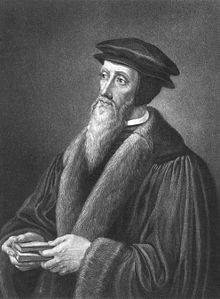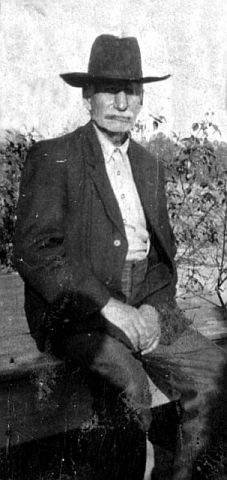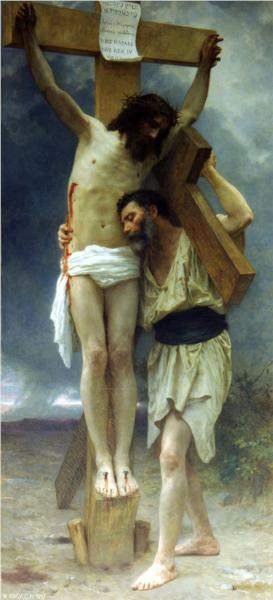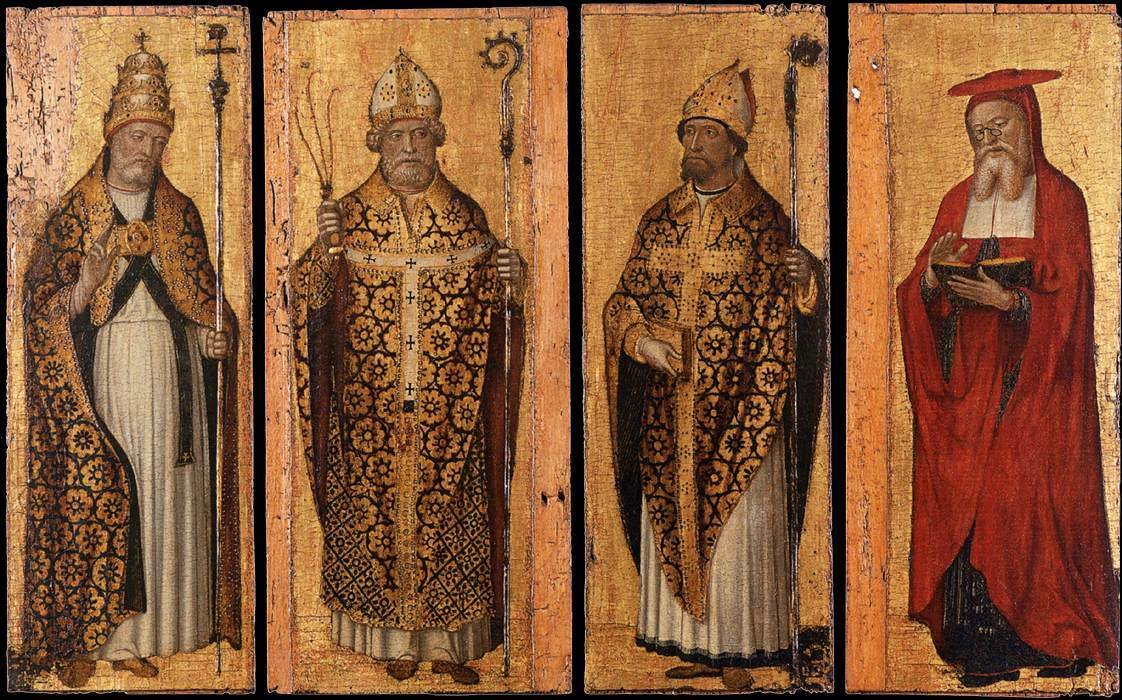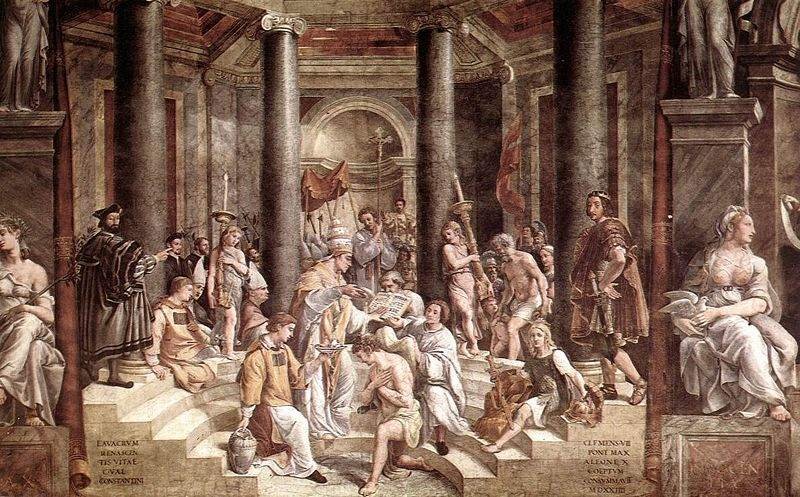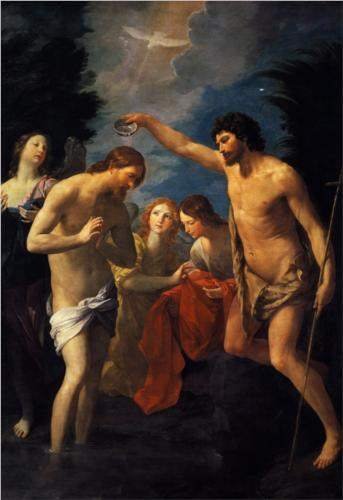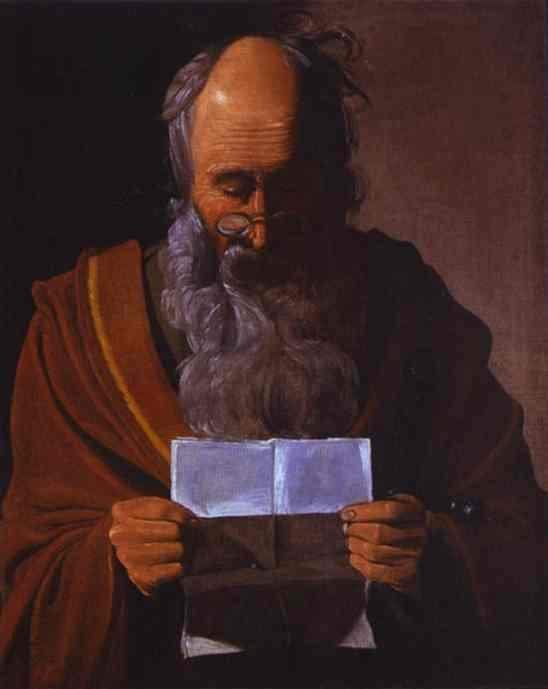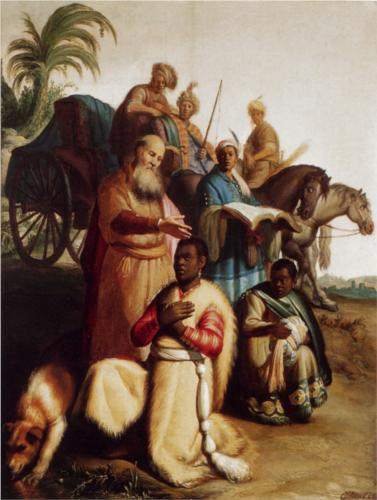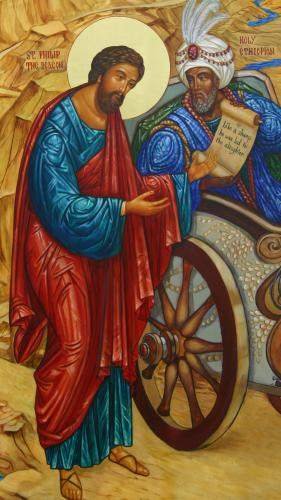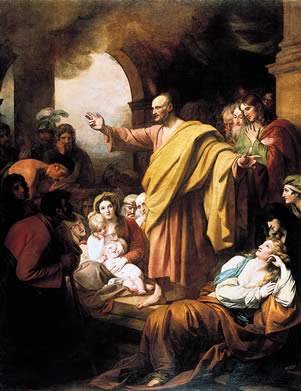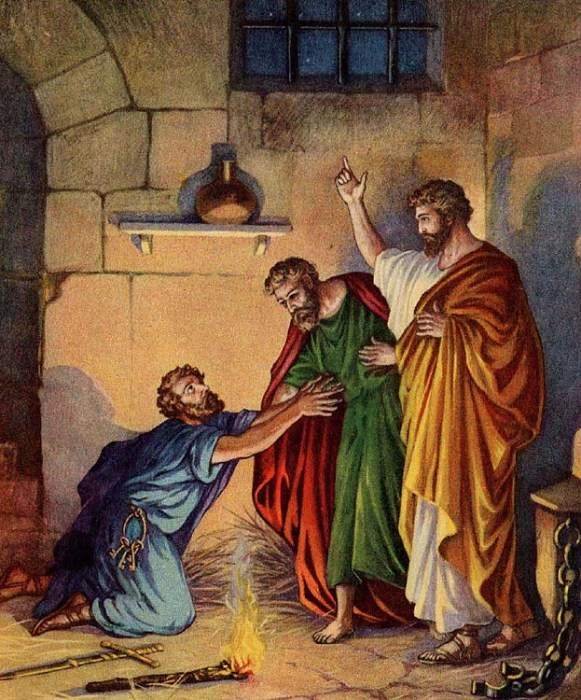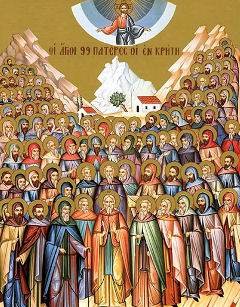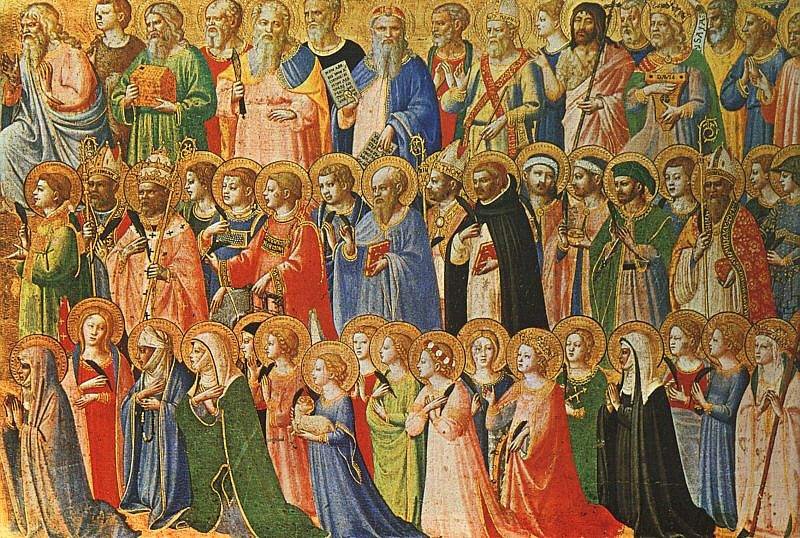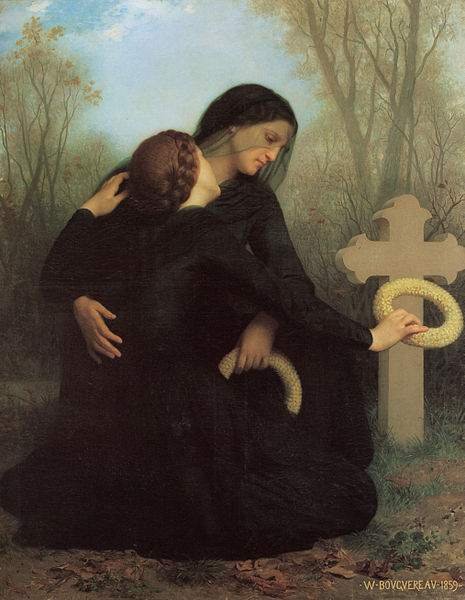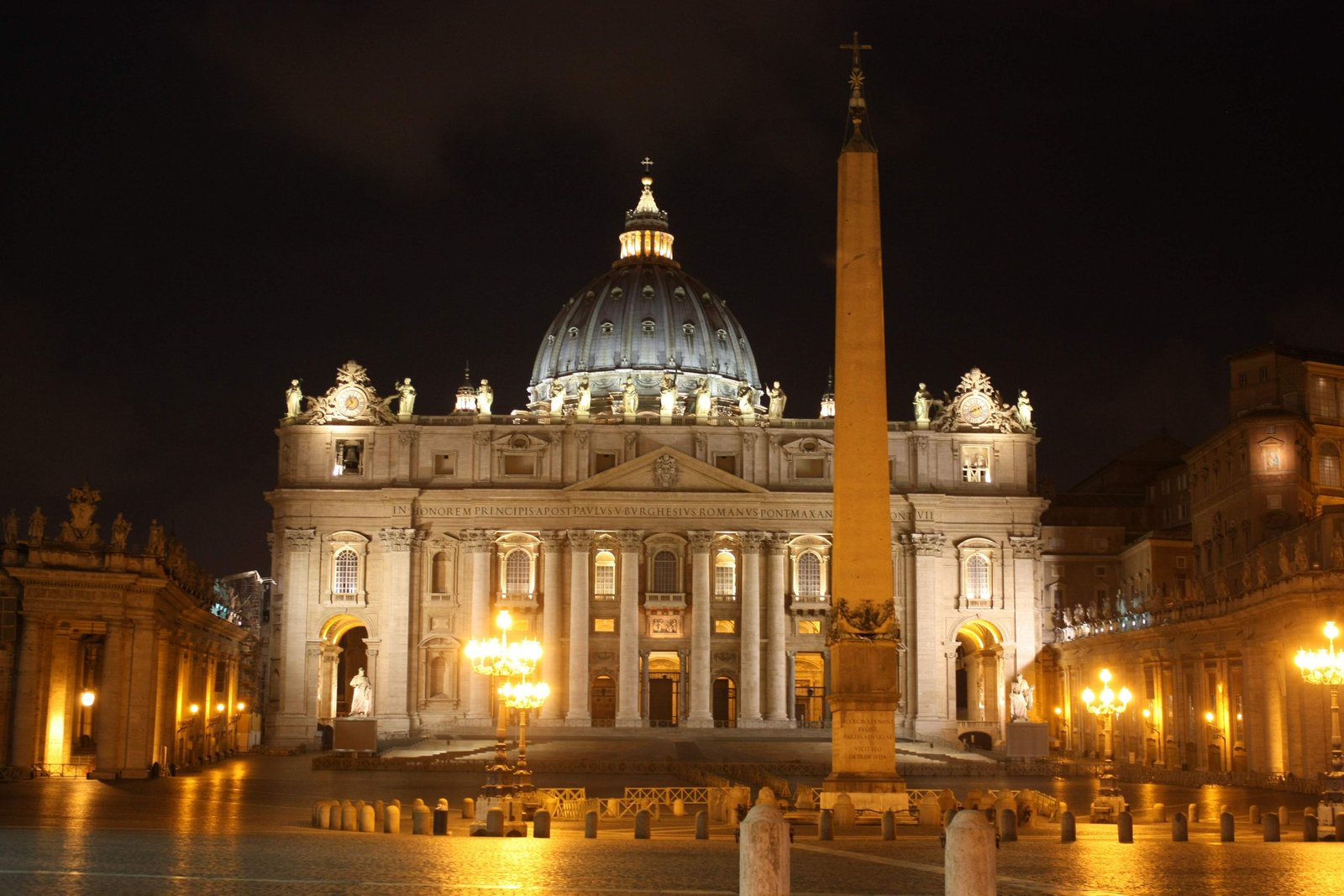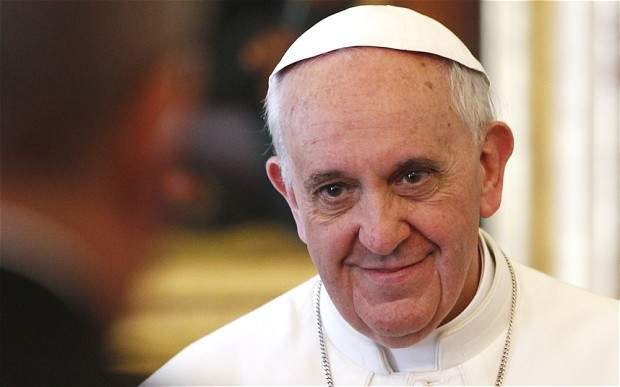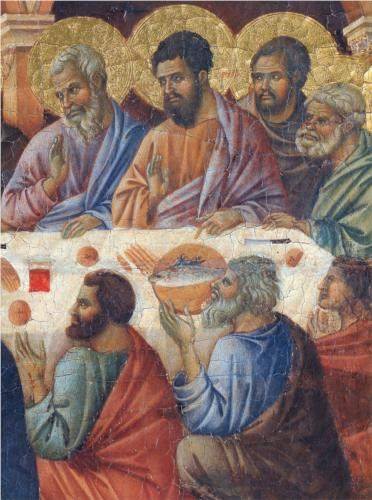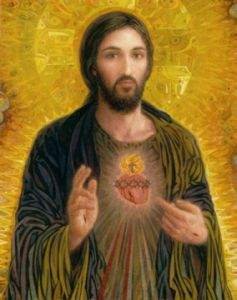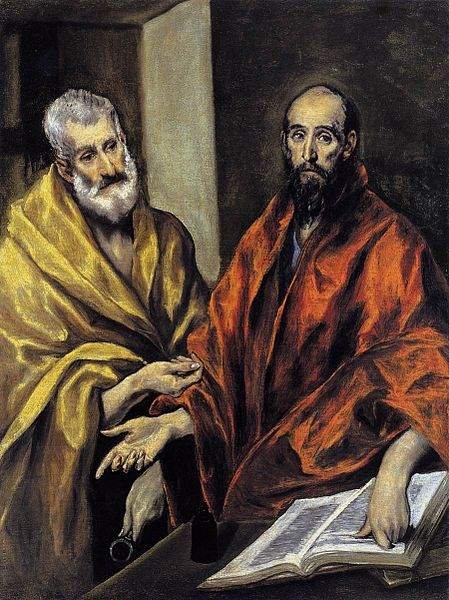
Saints Peter and Paul (between 1605 and 1608), by El Greco.
This started out as a response to someone’s blog, but I got carried away. Here are some answers to some common misunderstandings regarding the Sacred Tradition of the Catholic Church, especially with reference to the Protestant doctrine of sola scriptura. Pardon me for just dumping it here with so little introduction or conclusion, but I hope it will be helpful to someone.
1. Sacred Tradition — including Sacred Scripture — started out as oral tradition.
Of course, all Christian teaching started out as oral tradition. Until the Gospels were written, decades following Christ’s Ascension, the sayings and teachings and doings of Jesus were transmitted solely by word of mouth. Over the course of the first century, that was recorded in the books of Sacred Scripture we now call the New Testament. As you admit yourself, not everything Jesus did was recorded. There’s no doubt that not everything Paul preached was recorded; he often refers in his letters to teachings he gave in person, the content of which we are left to infer. Paul was a gifted writer, but we have from him only a handful of letters written for specific purposes, handling local business or offering correction or rebuke to specific situations and problems. None of the authors of the New Testament set out to write a compendium of the Christian faith or a catechism for teaching everything there was to know.
You believe, as the Catholic Church affirms, that Sacred Scripture is the heart of Divine Revelation, the very, infallible, written Word of God. But what do you suppose happened to all the stories of the other things Jesus said and taught and did, all the other things that Paul and the Apostles taught? Did people just forget them? And did these things somehow become less valid or less real because they weren’t written down? Everything that came from the mouth of Jesus was the Word of God. Did it cease to be the Word of God, cease to be Divine Revelation, because it was among those “many other signs Jesus did”?
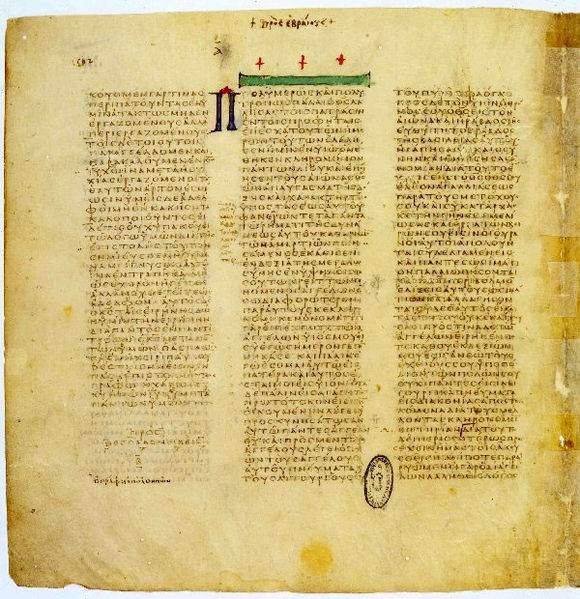
A leaf from Codex Vaticanus, one of the earliest extant manuscripts of the Greek New Testament.
2. Sacred Tradition is the Word of God.
No, of course it didn’t, and the early Christians did not forget. They cherished every word that issued from the mouth of God through Christ, every word taught to them by the Apostles. Did the words of Jesus cease to be Divine Revelation because it was the Apostles repeating them and teaching them? Did they cease to be Divine Revelation after the Apostles died, and their disciples taught them to the next generation of Christians? No, the Word of God spoken orally was and still is just as much the Word of God as the Word of God written in Scripture — just as much as when we memorize and recite Scripture, we are speaking the Word of God. Memorizing and reciting the teachings of Jesus taught from one generation of Christians to the next is no less the Word of God — in fact, we depend upon it. You do, too. This is how the teachings of Jesus were transmitted for the generation or two before they became Scripture. Proclaiming the Gospels as the Word of God depends on the oral tradition of Christ’s teachings being and remaining the Word of God.
You believe that at the death of the Apostle, Divine Revelation was closed. We, the Catholic Church, go even further than that: Jesus Himself, the Word spoken by God, was the ultimate revelation. The New Testament is the New Testament not just because it was written by the Apostles, not even solely because it was inspired by Holy Spirit (which it was), but because it records the words and teachings of Jesus, the words of Divine Revelation Himself. What distinguishes the documents accepted into the New Testament canon as Scripture, versus the ones from only a generation later, such as the Didache or the Epistle of Clement to the Corinthians (1 Clement) — which were both among those documents considered for inclusion in the New Testament — was the inspiration of the Holy Spirit, but also the fact that the canonical books were written by the Apostles or their associates, witnesses to the life of Christ Himself, or who were taught immediately by such witnesses — and above all that they consisted almost purely of the word and teachings of Jesus carried on and taught by the Apostles.
But did the words of the Word of God cease to be Divine Revelation because they weren’t written in Scripture? Did they cease to be the Word of God at the death of the last Apostle? Why the arbitrary cutoff at the death of the Apostles?
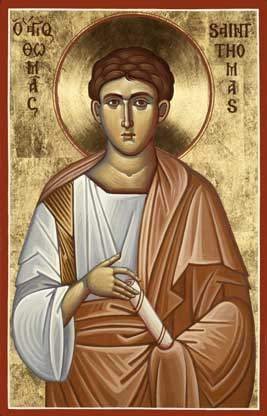
St. Thomas the Apostle.
3. Sacred Tradition was all most of the Apostles left us.
Most of the Apostles were too busy preaching to the ends of the earth to do much writing. That in itself, by the way, is an argument against sola scriptura: if the Apostles had any anticipation that only their written teachings would remain the Word of God after their deaths, wouldn’t you think they’d have done a lot more writing? What about St. Bartholomew, who preached in Armenia, or St. Thomas, who brought the Gospel all the way to India? Or St. James the Greater, who is traditionally held to have preached in Spain? Would they have given their lives as martyrs for the Lord so eagerly, never having written down their teachings, if they believed that all their preaching and suffering was worth smack — that after they died, their teachings would bring no one else to salvation, their deaths would turn no hearts, but that their mission fields would have to wait for someone else to write and compile and disseminate the New Testament? In any case, most of the Apostles, common men of Galilee, were probably barely literate if at all, as were the people they preached to.
But as for the rest of the Word of God — that that didn’t get written in Scripture: People didn’t just forget it, or dismiss it as no longer necessary now that they had the New Testament, which was “sufficient to lead a person to eternal life.” They didn’t decide, at the death of the last Apostle, that “nothing else was needed” and that the other teachings they had received from the Apostles and their followers were extraneous and no longer to be preserved or believed. Yeah, that story about St. Veronica wiping the bloody face of the suffering Savior? That’s not in Scripture; we don’t need that anymore. That liturgy you’ve been developing? No longer necessary; we have the New Testament now. Early Christians were even more excited than you are to preserve the Word of God, to learn and pass on the teachings of their Savior, the Son of God! They received no instruction from Scripture that they should discard and no longer believe the rest of the deposit of faith they had received. Not only did they receive no such instruction, but the fact is plain that they did not, since without a doubt these traditions continued to be transmitted by the earliest Christians. And if you suppose they had received such teaching to reject unwritten traditions about our Lord from the mouths of the Apostles themselves — then the idea of sola scriptura depends on an extrascriptural tradition and is self-contradictory.
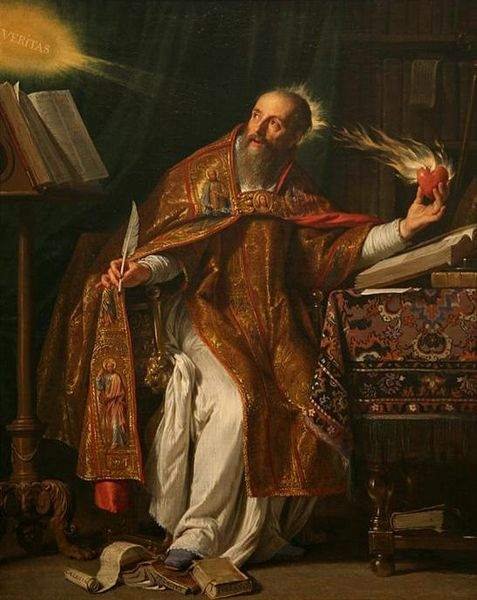
St. Augustine (c. 1645-1650), Philippe de Champaigne.
4. Sacred Tradition didn’t stay “oral tradition.”
Many Protestants speak of Catholic “traditions” — as you do above — as if the teachings of the Catholic Church consist of and depend solely on “oral traditions,” the kind of folklore American Indians tell around a powwow — passed down from pope to pope for 2,000 years like a tragic game of telephone. Protestant critics complain that “tradition” is something nebulous and undefined that Catholics can say is whatever they want it to be. “You made that up!” “No I didn’t, it came from tradition!”
But that is a fundamental misunderstanding. I’ve been writing about the first generations of Christians who faithfully preserved and passed down the words and teachings of Jesus, eventually recording them in Scripture. I’ve shown, I hope, that the other teachings of Jesus and the Apostles, those that were passed down (that’s all “tradition” means, by the way, is “that which is passed down”), didn’t cease to be Divine Revelation just because it was spoken and not written. They didn’t forget — it was crucial not to forget. Paul exhorted Timothy, “What you have heard from me before many witnesses entrust to faithful men who will be able to teach others also” (2 Timothy 2:2) — and that’s exactly what the early Christians did. They taught to others these teachings, and ensured that they were passed on intact, just as carefully — even more carefully — than the bards passing on the epics of Homer, who memorized the whole of those vast poems and carried them for centuries.
But unlike Homer, the Church didn’t have to carry them for centuries. Over the first few centuries, thankfully, the Christian faith found its way to learned and literate men who, bit by bit, set these remaining teachings of Jesus and the Apostles — the whole counsel of God (Acts 20:27) — to writing. We call these men the Church Fathers.

St. Cyprian of Carthage
5. Sacred Tradition is just as much Divine Revelation as Sacred Scripture — but not the same.
I’ve often heard it charged from Protestants that the Catholic Church “places Scripture and Tradition on the same level” or “equal authority.” Well, in a sense, yes. But I would dispute the claim that the two have “equal authority” — as if the two are “equal” to each other. They are not. Both Scripture and Tradition form one deposit of faith, but the two have very different characters.
Sacred Scripture is, the Catholic Church teaches and affirms just as much as any “Bible Christian,” the very written Word of God, inspired (“breathed out”) by the Holy Spirit. As such, it is infallible, inerrant, and indisputable in matters of faith, doctrine, and morals. God has spoken. We do not believe that Scripture is “perspicuous” or “self-interpreting” — a ridiculous claim to anybody who has spent time or energy laboring in scriptural translation or textual criticism or exegesis. Scripture is thousands of years old, written in languages and idioms no one speaks anymore, in ancient cultures and contexts very different than our own. The act of translation is itself an act of interpretation, so anyone claiming that their English Bible is “self-interpreting” is already mistaken.
Sacred Tradition, on the other hand — not “oral traditions” — is a very different animal. The writings of the Church Fathers are not infallible; they are not even inspired. The Church Fathers are not Sacred Tradition, but they do contain Sacred Tradition. They contain Divine Revelation not as Sacred Scripture — which is “pure silver, seven times refined” (Psalm 11:7), the pure, unadulterated Word of God — but more as unrefined silver ore — which contains pure silver, but also a lot of dirt and rock. The Church Fathers record the precious teachings of Jesus and the Apostles that they received from their teachers, who received them from their teachers, who received them from the Apostles themselves (in some cases, as with St. Clement of Rome or St. Ignatius of Antioch or St. Irenaeus of Lyons, as close as a generation away) — but they also have a lot to say that is merely their opinion or reflection. And sometimes they are plain wrong. Sometimes, many times, the Church Fathers even disagree with each other! But it is the things they agree upon, the core of apostolic teachings, that we receive as Sacred Tradition.
It is only the pure silver that is absolute and authoritative. If we could obtain the pure, undiluted Sacred Tradition in the form that came directly from the mouth of Jesus, it would be just as absolutely authoritative and divinely inspired as Scripture — since Scripture, too, originated as words from the mouth of Jesus. But the dirty ore of the Church Fathers is not that. The Sacred Tradition contained especially in the Church Fathers, but also in the ancient liturgy of the Church, in the pronouncements of Church councils, or even in the works of other writers, has to be refined in order to be authoritative. In the sense that Sacred Tradition comes from the exact same source as Scripture, the very words of Jesus — it is absolutely equal in authority. But practically speaking, since we don’t have that pure Tradition, it functions as a secondary authority — no less authoritative, but dependent on and supported by Scripture — which Tradition also supports.
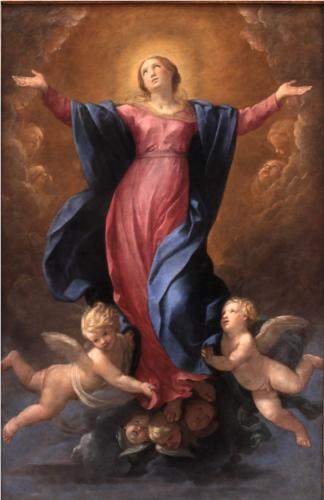
Assumption of the Virgin (1580), by Guido Reni.
6. Sacred Tradition cannot contradict Scripture.
Protestants complain that Catholic Tradition “contradicts Scripture.” Such is, to begin with, patently impossible: if the two come from the same source, how can they contradict? Catholic teaching does not contradict Scripture. Perhaps it contradicts Protestant interpretations of Scripture — but such interpretations have little grounding in history or tradition. The fact is, even speaking practically, the Church Fathers, as the earliest recipients of Scripture and Tradition and of all Christian teaching, know how to interpret Scripture and Tradition in light of each other better than anyone else. Catholic teaching, coming both from Scripture and from the Tradition received from the Church Fathers, is in agreement with the Church Fathers: both what they believed, and how they interpreted Scripture. If these ancient interpretations contradict Protestant interpretations, then the Protestants have a much greater problem of contradiction than Catholics do.
It is the Magisterium of the Church — the teaching authority — that puts the pieces together; that reads and interprets Scripture authoritatively, and that gleans and refines from the Church Fathers and other sources the silver of Tradition. Protestants often complain that this places the Magisterium “above the authority of Scripture,” but such is also impossible. The Magisterium is constrained by what Scripture and Tradition say — what we have received in the deposit of faith. The Magisterium is not free to “make stuff up,” or pull Blessed Virgins out of hats, or any other such. Everything the Magisterium pronounces must be contained in Scripture and Tradition and in accord with both. The Magisterium cannot pronounce, say, that adultery is now perfectly moral and legal and okay in God’s sight, since such plainly contradicts the direct word of Scripture, “Thou shalt not commit adultery,” and since this contradicts the unbroken teaching of the Church for 2,000 years.
What about some of the doctrines that Protestants claim “contradict Scripture”? What about the big one, the veneration of Mary? First, Scripture plainly demonstrates the beginnings of devotion to the mother of our Lord: “My soul magnifies the Lord, / and my spirit rejoices in God my Savior, / for he has regarded the low estate of his handmaiden. / For behold, henceforth all generations will call me blessed” (Luke 1:46–48) — by all appearances an early liturgical prayer or hymn, which we today call the Magnificat. There is nothing in Scripture to demonstrate that we shouldn’t honor our Lord’s mother, for Jesus Himself loved her and honored her. And as for pulling Virgins out of hats — the tradition of honor given to Mary dates to the earliest centuries of the Church, found among the earliest Church Fathers and ecclesiastical writers. There is nothing in the Church’s doctrines regarding Jesus and Mary that isn’t well attested to in the writings of Tradition. The Church doesn’t “make stuff up.”
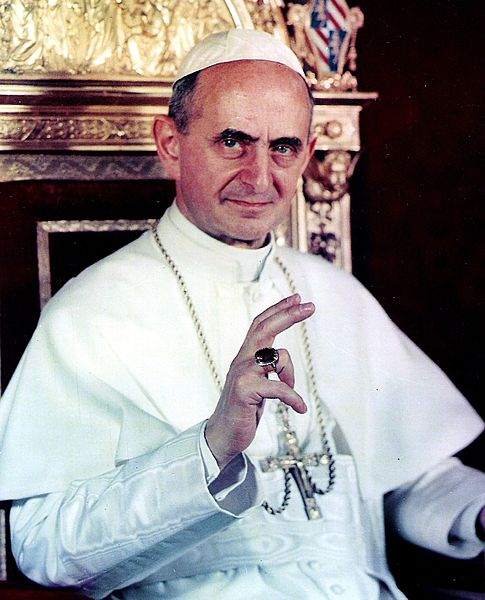
Pope Paul VI, who re-called the Second Vatican Council following the death of Pope John XXIII in 1963.
7. Sacred Tradition is transparent and open.
I have heard Protestants complain that the Tradition of the Church is something closed and unknown, a well-guarded secret that only the prelates of the Church are privy to, with the result that the Church can proclaim anything as “Tradition” that she wishes, and no one will be the wiser. But such, again, is patently false. Every bit of the body of material that comprises Sacred Tradition is readily available, much of it online. I have never seen an organization go to greater lengths to be open and transparent as to the content and basis of its doctrines. Front and center, the Church publishes the Catechism of the Catholic Church in a dozen or so different languages, available free on the Vatican website, which not only lays out clearly and succinctly the doctrines of the Christian faith, but gives exhaustive references to Scripture, Church documents, and the Church Fathers to locate where and on what each doctrine is based. Many if not most of those Church documents (certainly the recent ones) are available for free on the Vatican website. Many of the most important writings of the Church Fathers are readily available online, both from Catholic and Protestant websites. (For what it’s worth, even New Advent, the Catholic site, reproduces a Protestant edition of the Church Fathers, the same one as on CCEL, since that is the most extensive English edition of the Church Fathers readily available in the public domain, and it’s generally a pretty fine one.) A distillation of the doctrinal sources of most important Catholic doctrines is readily available in the Enchiridion Symbolorum or Sources of Catholic Dogma. So, no, the idea that the Tradition of the Church is closed and unknown is without foundation.
Ending abruptly, because I don’t seem able to wind this down: I hope this clears up some confusion.

